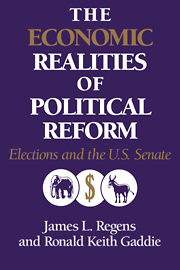Book contents
- Frontmatter
- Contents
- List of tables and figures
- Acknowledgments
- Abbreviations
- Introduction
- 1 The Senate in transition and campaign finance
- 2 Early money and profit taking in Senate campaigns
- 3 Targeting rent provision by major interests
- 4 Sitting in the cheap seats?
- 5 Implications for campaign-finance reform
- 6 Reform and the rent-seeking legislature
- Notes
- Bibliography
- Index
6 - Reform and the rent-seeking legislature
Published online by Cambridge University Press: 18 December 2009
- Frontmatter
- Contents
- List of tables and figures
- Acknowledgments
- Abbreviations
- Introduction
- 1 The Senate in transition and campaign finance
- 2 Early money and profit taking in Senate campaigns
- 3 Targeting rent provision by major interests
- 4 Sitting in the cheap seats?
- 5 Implications for campaign-finance reform
- 6 Reform and the rent-seeking legislature
- Notes
- Bibliography
- Index
Summary
Each, in consequence, has a greater regard for his own safety or happiness, than for the safety or happiness of others; and, where these come in opposition, is ready to sacrifice the interests of others to his own.
John C. Calhoun Disquisition on GovernmentPersonal abuse, constant tension, limited financial return, disorganized and dislocated personal life, and a multitude of uncertainties all serve to discourage good men from service in Congress.
Former Congressman Frank E. Smith Congressman From MississippiEconomists have long held that potentially contestable assets will attract investment in direct proportion to their production capabilities. A standard assumption in the public choice literature is that the relationship between politicians and economic interests can be modeled in a manner similar to market exchanges. Presumably, politicians are in a position to extract rents from interested parties by providing selected benefits such as regulatory policies favorable to industry or other stakeholders in the political process. Our analysis demonstrates how the concept of rent seeking enhances understanding of political-action-committee (PAC) strategies, since PACs possess the capability of allocating financial resources to candidates as differential rents. Among legislators, the ability to produce policy outputs for particularized interests can be viewed as an exercise that allows members to place an implicit price on outputs. Benefit-seeking interests can bid for outputs in an effort to gain additional remuneration in the market through government subsidy or other implicit wealth transfer, such as monopoly regulation.
- Type
- Chapter
- Information
- The Economic Realities of Political ReformElections and the US Senate, pp. 99 - 105Publisher: Cambridge University PressPrint publication year: 1995



